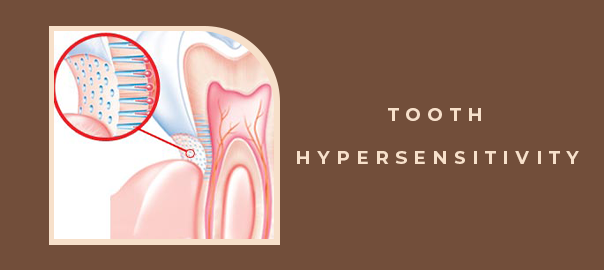
Tooth Hypersensitivity – Symptoms, Causes, Treatment
Tooth hypersensitivity, also known as dentin hypersensitivity or sensitive teeth, is a common dental condition characterized by discomfort or pain in response to certain stimuli. These stimuli can include hot or cold foods and drinks, sweet or acidic foods, or even cold air. Here’s a breakdown of the symptoms, causes, and treatment options for tooth hypersensitivity.
Symptoms
- 1. Sudden Pain: Sharp, sudden pain in one or more teeth when exposed to triggers like hot, cold, sweet, or acidic substances.
- 2. Discomfort: Sensations ranging from mild discomfort to intense pain.
- 3. Short-lived Pain: Pain typically lasts only for a short duration after exposure to the trigger.
Causes
- 1. Exposed Dentin: Dentin is the layer beneath the enamel that protects the inner nerves of the tooth. When the protective enamel is eroded or the gum line recedes, the dentin becomes exposed.
- 2. Enamel Erosion: Acidic foods and drinks, aggressive brushing, or conditions like acid reflux can erode tooth enamel, exposing the dentin.
- 3. Gum Recession: Gum disease or aggressive brushing can cause the gums to recede, exposing the sensitive root surfaces of the teeth.
- 4. Cracked Teeth: Cracks or fractures in teeth can expose dentin and lead to hypersensitivity.
- 5. Dental Procedures: Some dental treatments, such as teeth whitening or dental fillings, can temporarily cause sensitivity.
Treatment
- 1. Desensitizing Toothpaste: Specialized toothpaste containing ingredients like potassium nitrate or fluoride can help block pain signals from reaching the nerves.
- 2. Fluoride Treatments: Professional fluoride treatments applied by a dentist can strengthen tooth enamel and reduce sensitivity.
- 3. Dental Sealants: Sealants can be applied to cover exposed dentin or seal small cracks, providing a protective barrier.
- 4. Gum Grafting: In cases of severe gum recession, a gum graft procedure can cover exposed tooth roots and reduce sensitivity.
- 5. Dental Bonding or Veneers: These cosmetic procedures can cover exposed dentin and protect the tooth surface.
- 6. Avoiding Triggers: Limiting consumption of acidic, sweet, or extremely hot/cold foods and beverages can help reduce sensitivity.
- 7. Proper Oral Hygiene: Gentle brushing with a soft-bristled toothbrush and using non-abrasive toothpaste can prevent further enamel erosion.
- 8. Professional Dental Care: Regular dental check-ups can help identify and address underlying causes of tooth sensitivity.
If you experience persistent tooth hypersensitivity, it’s important to consult with a dentist to determine the underlying cause and develop an appropriate treatment plan. Ignoring tooth sensitivity can lead to further dental problems, so early intervention is key to maintaining oral health.
DISCLAIMER:Please note that the prices mentioned on this page: (a) present a range (depending upon the severity of the dental condition, the technology used in treatment, type of dental products used, etc.); (b) are true as on the date of this page and may change on a later date, in accordance with the standard company policy; (c) may be subject to standard aberrations or generalizations on account of the use of AI in general Google/internet search by you.Leave a Reply
Leave a Reply
Explore More Similar Posts
Explore More Blogs


Leave a Reply